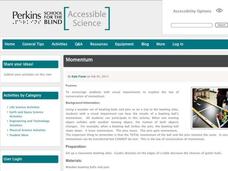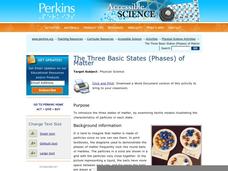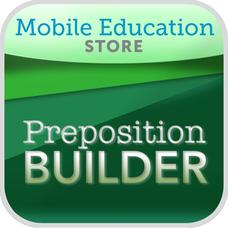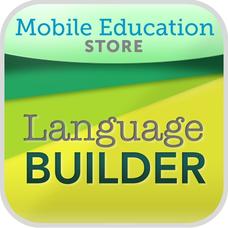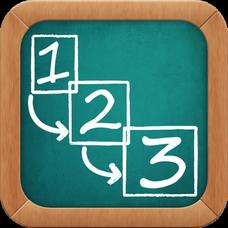Perkins School for the Blind
Modified Golf
Golf is a popular game that is enjoyed around the world. Invite your pupils with visual impairments or blindness to putt a few balls or make a hole in one. This activity provides several very good suggestions as to how you can teach an...
Curated OER
The Little Engine that Could Mini Unit Plan
The best part about teaching little ones is setting up fun, thematic learning stations. Here is a full day of activities that all relate to the story, The Little Engine that Could. Included are six different activities that cover art,...
Perkins School for the Blind
The Printing Process
The printing process was a technological innovation that revolutionized the modern world. Your learners with visual impairments can experience this process by creating a print by using letterpress printing. They use cardboard, glue, and...
Perkins School for the Blind
Name That Frequency
How cool! This plan uses old cassette tapes to show frequency from traveling vibrations. To prepare for the lesson, tactile frequency diagrams are made and then placed near the video tapes or dominoes that are already set up. When they...
Perkins School for the Blind
Momentum
The laws of momentum can lead to fun! Learners with visual impairments use bowling pins and a bowling ball to model the law of conservation of momentum. They take turns bowling with differing degrees of force to explore how energy is...
Perkins School for the Blind
Introduction to Scientific Inquiry
Every great scientist knows that the process of inquiry is a very important skill. Provide your learners with visual impairments with an opportunity to explore objects scientifically. They examine several pieces of fruit and generate...
Perkins School for the Blind
Casting with Plaster
What a fun lesson! Your class can experience the design and construction process by creating a mold and a duplicate for an engraved image. The lesson is specifically written for learners with visual impairments and allows them to create...
Perkins School for the Blind
Testing the Strength of a Column
Columns have been used throughout the world because they are good load-bearing structures. Learners with visual impairments conduct an experiment to work through the design process as well as to understand this engineering phenomenon....
Perkins School for the Blind
Safety Crash Testing
Everyone knows that cars have safety features, but wouldn't it be fun to design your own? Learners with visual impairments build a ramp and then attempt to use the material provided to design a safety system to protect a raw egg from a...
Perkins School for the Blind
Volume, Mass, and Density Boxes
Mass and density are difficult topics for kids to understand, and even more difficult when you have visual impairments or blindness. Learners will make boxes and fill them with cotton, sand, or crushed paper. They will feel the density...
Perkins School for the Blind
The Mystery Box - Making Observations and Collecting Data
Making observations and collecting qualitative and quantitative data is a vital skill all scientists need to practice. Help your scientists with partial and no sight learn how to use their other senses to make observations for...
Perkins School for the Blind
The Three Basic States (Phases) of Matter
There are three basic states of matter: Solid, liquid, and gas. Help your learners with visual impairments to understand the chemical nature of each state of matter with tactile elements. Marbles are used to model the particles in each...
Perkins School for the Blind
Polyatomic Ion Bingo
If your class is learning about polyatomic ions and needs a fun way to study those chemicals, then a bingo game might be right up your alley. This bingo game is intended to boost memorization skills, specifically the names of tricky...
Perkins School for the Blind
Mixtures and Solutions
Mixtures and solutions are different; one can be separated fairly easily and the other cannot. This hands-on experiment was written specifically for learners with visual impairments or blindness. They will use lemonade and trail mix to...
Perkins School for the Blind
Conservation of Mass
How do you teach a student with visual impairments about the conservation of mass? You use tactile models that represent the theoretical concept. Baking soda and vinegar are used to add gas to a deflated balloon. Learners will feel the...
Perkins School for the Blind
Conductors of Heat - Hot Spoons
Why is the end of a spoon hot when it's not all the way in the hot water? A great question deserves a great answer, and learners with visual impairments will use their auditory and tactile senses to get that answer. A talking...
Perkins School for the Blind
Building a Basic Series Circuit
Make science a fully accessible subject for your learners with visual impairments. They'll use tactile models to explore the nature of basic electrical circuits. Template board, wires, batteries, and Velcro are used to construct the...
Mobile Education Store
PrepositionBuilder™
Prepositions can change the meaning of a sentence and children need to know how to use them properly. Here is an app that has been designed with the struggling learner in mind. It uses visual and audio cues to help elementary-aged...
Mobile Education Store
LanguageBuilder for iPad
Help your child hone his/her verbal communication skills and basic understanding of sentence structure with an app that promotes descriptive verbal interactions. The child is presented with an image, prompted to make a sentence, and then...
Mobile Education Store
ConversationBuilder
Some students struggle in social situations or when it comes to conversing with peers. Conversation is key in developing relationships and in building strong social skills. This app can be used to help children with social anxiety, ASD,...
Mobile Education Store
Rainbow Sentences
Learners who struggle with grammar, foundational reading skills, and sentence composition can learn how to write proper sentences using an app that relies on research-based practice. It uses a color-coded formula that had been proven to...
Good Karma Applications, Inc
First Then Visual Schedule
Here is an app especially designed for care providers of children with autism or other developmental delays that will help them build customized picture schedules to help support the behavioral needs of their students.
John Talavera
Autism iHelp – Language Concepts
A parent of a child with autism, and a speech-language pathologist together developed this language-intervention app to be used with students with severe to moderate autism.
Perkins School for the Blind
Baseball
Baseball is an American pastime, super fun to play, and can be made accessible to learners with visual impairments. Instead of taking to the ball field, your class can learn the rules of the game by playing a small three-dimensional...






